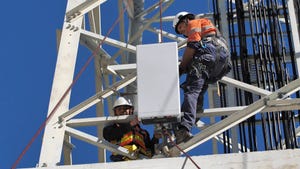Spirent on downward spiral as orders collapse
UK-based test-and-measurement vendor issues a profit warning it blames on a telco spending slowdown and the weak Chinese economy.

Spirent is on a downward spiral. The UK-based company, which operates in the confusing test-and-measurement part of the telecom sector, is the latest vendor to blame telco parsimony for its parlous finances. And they look especially bad. This morning, Spirent was forced to include a profit warning in its trading update for the recently ended third quarter. Among other things, it told investors that a collapse in orders will "very materially affect" its operating profit this fiscal year. Its share price tumbled 31% on the London Stock Exchange when the market opened.
The specifics include a 24% drop in order intake over the first nine months, compared with the same period last year. That comes after order intake was shown to have fallen 19% for the first half, to about $239.4 million. Spirent went on to say that sales would also be 20% lower than they were for the first nine months of last year. "Management is taking appropriate cost action," said Spirent. In plain English, that probably means it is cutting jobs.
Another look at the company's earnings statement for the first six months will not improve anyone's mood. Despite reporting a gross margin of about 72% – the same it managed a year earlier – Spirent's operating profit did a vanishing act, dropping from $40.1 million for the year-earlier half to $1.6 million. Spirent evidently found some money between there and the bottom line, recording a net profit of $4.8 million, down from $40.3 million the year before.
Heavy exposure to China seems to have dearly cost Spirent. While other companies reporting in US dollars have been kept out of China by US government sanctions, Spirent looks to have been excluded from recent deals by the unwillingness of Chinese customers to spend any money.
It was entirely unexpected by the company, with Spirent previously counting on a strong pick-up in Chinese orders during the third quarter. Instead, government authorities trimmed budgets as the Chinese economy continued to deteriorate. For the first half, sales generated in China fell from $56.7 million last year to $36.7 million, accounting for about 16% of the total.
Other factors contributing to the misery included Spirent's broader failure to convert discussions with prospects into firm deals in the market for lifecycle service assurance. It also highlighted delays to work for a "leading global bank" but insisted it had made good progress on finalizing requirements.
Good times ahead, eventually
Like other telecom vendors hurt by the spending slowdown, Spirent is eager to reassure investors that 5G remains a good medium- and long-term bet. The rollout of "standalone" 5G networks – where operators invest in a new core – has not happened as quickly as the industry hoped it would, Spirent admits. But it's confident of "acceleration" next year, driven partly by the phenomenon of private 5G and partly by the rollout of more "cloud-native" 5G technology.
Some telcos will probably have to reopen their wallets after running down inventory they built up during the crunch years. The unstoppable rise in data usage and traffic levels will also force operators to spend, according to Ericsson CEO Börje Ekholm. Yet smartphone users have not taken a helpful break from screen gazing while telcos pause their investments, and networks seem to be coping. Capital expenditure excluding money spent on spectrum licenses dropped by 16% at T-Mobile US for the first six months, for example, as another 3 million customers piled onto its network.
What Spirent and other vendors really want to see is the sort of telco revenue growth that could eventually trickle down in extra spending on network products. Right now, operators are coalescing around two strategies. One involves persuading developers to pay for newly unlocked features of the 5G network, made accessible via standardized application programming interfaces. The other is to clobber Big Tech with penalty fees for developing the wildly popular Internet services that have generated such excess demand for telco networks. Telco share prices suggest markets aren't buying into either.
Headcount now seems likely to shrink at Spirent. Last year, the company employed an average of 1,648 people globally, according to its annual report, and the number was up from 1,582 the year before. As much as 54% of revenues went into product development, sales and marketing and administration, explaining the chasm between gross and operating profits. Some turbulence lies ahead.
Read more about:
EuropeAbout the Author(s)
You May Also Like












